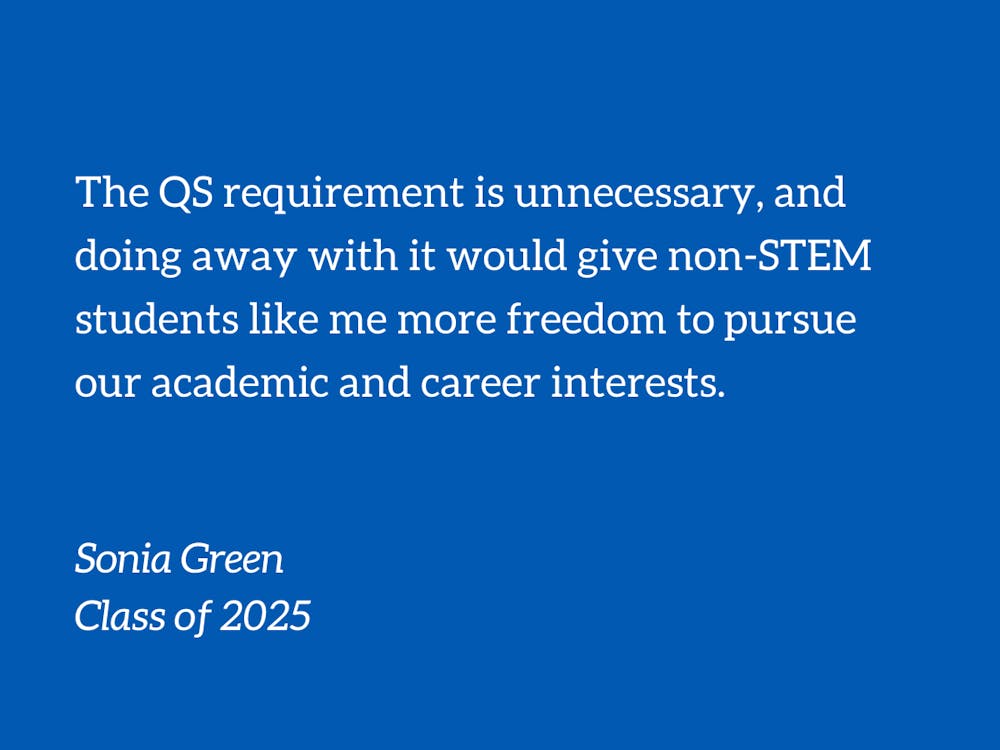When students first arrive at Duke, they are bombarded with a plethora of acronyms and academic codes. During class registration letters like CZ, NS and ALP are assigned to various courses on DukeHub. Some students jump into their four-year plan early and decide to knock out some of these requirements. Some of us — myself included — wait until this becomes an unavoidable reality.
As a self-proclaimed non-STEM student, I found most of these areas of knowledge to be relatively easy to fulfill. The two areas that stumped me were the natural sciences (NS) and quantitative studies (QS) requirements. I was fortunate enough to be able to find some science courses that I was able to justify taking because they were somewhat related to my academic areas of interest. However, the QS courses were a struggle to fulfill. I looked at computer science — but I don’t like coding, nor do I have any prior experience. I did well in my math classes in high school — but at Duke, the math courses covered very specific concepts and were unlike anything I’d seen before. I even looked at the statistics courses that people recommended but then I remembered, I don’t like stats. Beyond the fact that I simply don’t like or want to take QS courses, they are not connected to any of my professional interests or aspirations. Does a journalist need to know how to code? Does an author need to understand calculus?
Reading comprehension, cultural competency and historical knowledge are universally applicable skills for all students. However, being able to code or do calculus is only relevant for students who want to pursue a career in STEM. The QS requirement is unnecessary, and doing away with it would give non-STEM students like me more freedom to pursue our academic and career interests.
Some might argue that STEM skills like web development and statistical analysis are necessary too. I would argue that this is not true. While it might certainly help an entrepreneur if they can code their own website themselves, website development is already its own career path and a web developer with strong coding skills can be hired for the job. It might help an attorney if they know how to analyze statistics, but if they are involved in trial work, for example, they would call up an expert witness to conduct statistical analysis and present this information to a jury.
A liberal arts education “offers an expansive intellectual grounding in all kinds of humanistic inquiry.” However, these kinds of humanistic inquiry must be relevant to students or they are a waste of time. Departments like African & African American Studies, International Comparative Studies and Gender, Sexuality & Feminist Studies arguably do just that without requiring students to take any QS courses. Their interdisciplinary nature means students are already exploring a plethora of academic disciplines. The main difference between QS skills and social science skills is that QS skills are specific to fields or paths under the STEM umbrella. The social sciences deal with human behavior and society — something that is relevant to all of us.
The QS area of knowledge forces students to spend valuable time covering STEM concepts instead of exploring their academic interests. A STEM student can say the same thing about social science concepts, but even doctors, engineers and software developers need to know how to read and analyze dense written material and engage with people and cultures different from their own. In contrast, many of the careers that we as non-STEM students aspire to pursue don’t require a knowledge of quantitative concepts beyond what we already know coming into college. We understand mean, median and mode. We know what standard deviation means in the context of a dataset. We know how to add, subtract, multiply and divide. We can calculate percentages. Computer Science 101 and a collegiate math course don’t really offer much to students who do not wish to pursue a career in tech or related STEM fields. Sure they teach problem-solving and exercise a different part of your brain, but doesn’t every academic department do this to some degree?
Non-STEM departments like history, cultural anthropology, and African & African American studies all teach students valuable life skills applicable to any career. That is why other requirements such as the Civilizations (CZ), Social Sciences (SS) and Arts, Literature and Performance (ALP) areas of knowledge teach students cultural competency, history, critical thinking and reasoning. These courses are also accessible. Pre-med students can find courses related and relevant to their interests in medicine. Computer science students can find courses related to technology and its role in society. What equivalent exists for students forced to take two math classes?
In contrast, many courses are not accessible to students who don’t come from a STEM background. A course can say that coding experience is not required, but true beginners will be lost when drop/add is over. A math course can market itself to students just looking to fulfill a requirement, but when the concepts are not taught well, as I have experienced firsthand, these students can be left more confused than before.
I understand that my professional interests are unconventional as a Duke student, but the QS requirement does not teach universally useful skills. It’s okay to not know how to code or do advanced math. It is not okay to lack reading comprehension skills or cultural competency. We’re not all destined to pursue STEM and that should be acceptable.
Sonia Green is a Trinity junior. Her column typically runs on alternate Tuesdays.
Get The Chronicle straight to your inbox
Signup for our weekly newsletter. Cancel at any time.

